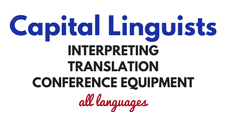Imagine waiting for a positive answer for your new investment project. You wait with eagerness, and you are still waiting, and still waiting, and then you remember it may take a couple of seconds because yes, this is the German language. So, you sit back into your chair with patience, and then finally – yes finally – you get your answer. This describes the complexities of the German language, in which often the true meaning of the sentence is only revealed as the last detail at the very end of the sentence. As Mark Twain famously said, “whenever the literary German dives into a sentence, this is the last you are going to see of him till he emerges on the other side of his Atlantic with his verb in his mouth”.
Other challenges for German to English interpreting services include lengthy compound nouns, overly specific terms, socio-cultural references, difference in sentence length between the languages, and much more. So, you ask, what sort of magic key do translators use to open the door to all of the solutions? It is practically a miracle if you are not stumbling along awkward phrasing and obviously translated material that makes little sense.
At Capital Linguists, our linguists deliver strong and precise equivalents, and the key is the result of maintaining the meaning, tone, style, and context of the original language, German. Our specializations for German to English interpreting services include:
- Conference Interpretation and Interpreting Equipment
- Document translation
- Subtitling
- Voiceovers
- Transcreation
- Website Localization
Conference Interpretation and Interpreting Equipment
Conference interpretation refers to simultaneous interpretation done real-time at conferences, meetings, summits, training sessions or any other gathering you are organizing, either in-person or virtually. For in-person events, our interpreters assist using interpreting equipment to make sure all listeners have a headset to listen to the English interpretation at the same time the speaker is giving their remarks in German. For virtual events, we use the interpretation function on Zoom so that your panelists or participants can listen to the English interpretation instantaneously as the German speaker is giving their remarks, by simply clicking their language of preference on the globe icon on the Zoom platform.
Document translation
Document translation is the accurate rendering of the written content in German into English. It requires thorough research on the topic and vast background knowledge, as well as excellent proofreading and editing skills. At Capital Linguists, our translators meticulously navigate German’s technical and precise nature, its language structures, separable verbs, and the many more challenges of this strong and wonderful language.
Subtitling
Subtitling from German into English can be described as a creative way of finding the shortest and most precise words to render the message, considering the limitations of space. German is famous for having long compound words heavy in meaning, and so the main focus for Capital Linguists translators is to make appropriate use of the space while maintain the original message in German.
Voiceovers
Voiceovers refers to recording spoken content in English that is originally in German, for example for interviews, documentaries, movies, or any other video content. With voiceover, instead of having to read subtitles, listeners will be able to hear the recording in English as well.
Transcreation
Transcreation refers to the creative and careful transferring of the German language and its entire cultural world into another entirely different language and cultural world. Transcreating content that is originally in German into English spoken in the United States may be very different to transcreating it into English spoken in Australia or the UK. Depending on the audience, the result can vary greatly. Transcreation implies not only translating German terms and grammatical structures, but also images, videos, colors to a culturally different sort of audience. The purpose is to maintain the core message, but to present it in a more appealing and culturally appropriate way, considering the country in which the message will be rendered.
Website Localization
Website localization is similar to transcreation in that the main purpose is to adapt the content to local users, appealing to them more appropriately in regards to the design, language and cultural preferences, images, layout, and more. The goal is to maintain the global image and purpose of the website in German, while making it more user-friendly and culturally appropriate for users in a specific country. With increasingly more internet traffic on websites that serve other countries, e-commerce websites and websites in the gaming industry, website localization has become an essential component for many organizations and companies.
